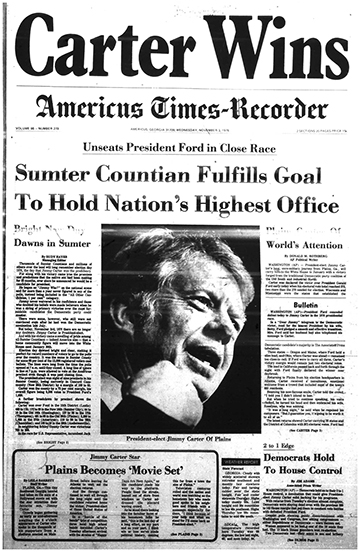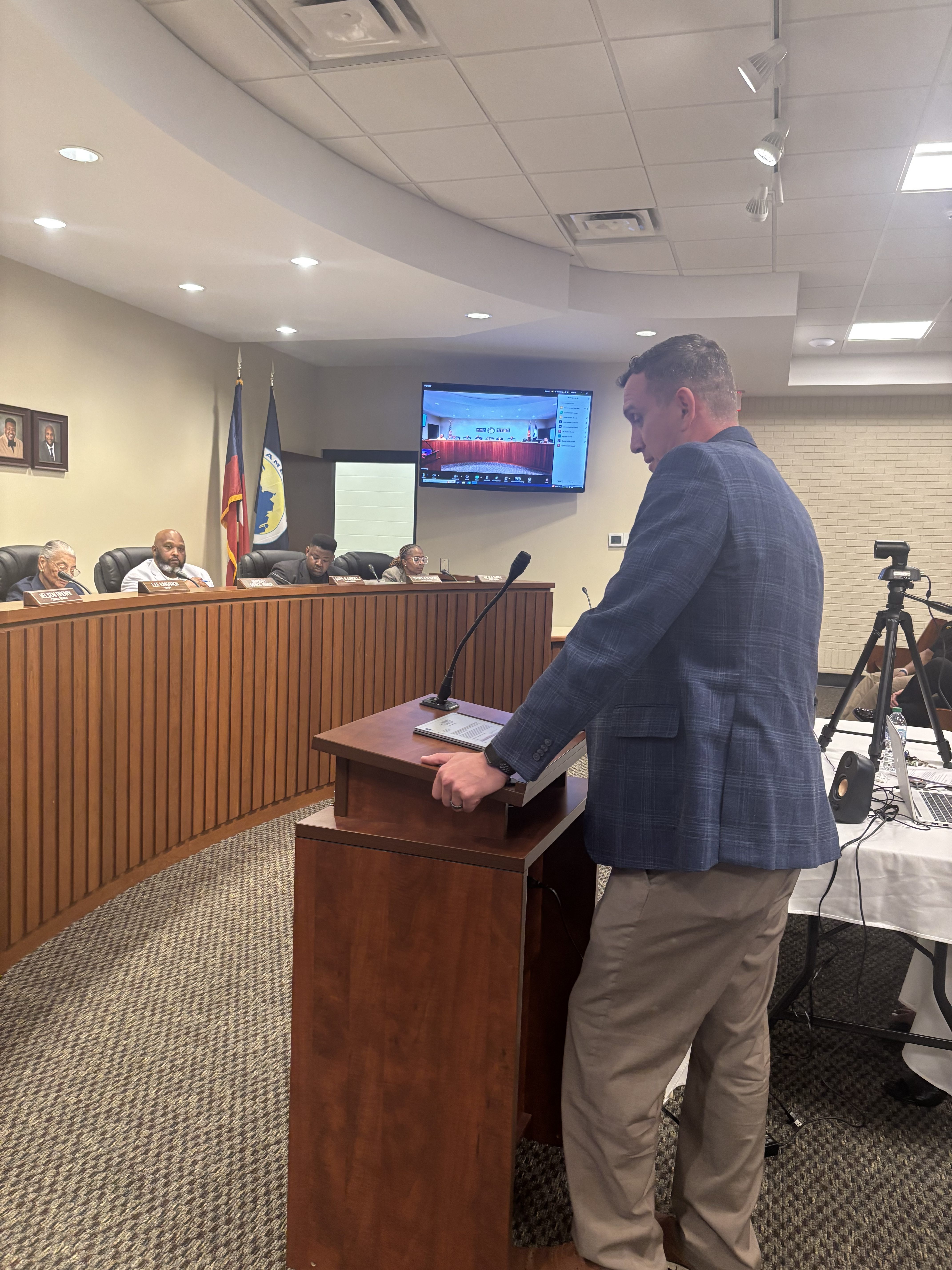1976: It’s Carter! Georgian wins presidency
Published 3:45 pm Tuesday, November 22, 2016
By D. JASON BERGGREN
carpenter-media.go-vip.net.americustimesrecorder.com
AMERICUS — On Nov. 2, 1976, Jimmy Carter, Sumter County’s own, was elected the 39th president of the United States. “Carter Wins” was the headline for the Americus Times-Recorder the next day.
As predicted by pollsters, it was a close contest. Carter narrowly defeated President Gerald Ford 50 – 48 in the national popular vote and 297– 240 in the Electoral College (Ronald Reagan received one vote from a Ford elector.) The electoral vote was the closest it had been since 1916.
Carter was confident of winning and in a playful mood. After he voted at his polling precinct in Plains, Georgia, he asked by a New York Times reporter who he voted for in the presidential race. Carter said he voted for “Walter Mondale and his running mate.”
From the very beginning of his long and arduous campaign in December 1974, Carter said he did not intend to lose. For nearly two years, he campaigned for the White House. Americans were looking for a Washington outsider, someone untainted by Watergate, and someone who had not voted to get us into a war in Southeast Asia. They viewed Carter as honest and trustworthy and as someone who cared about the underdog. First in Iowa and New Hampshire, then the Democratic party, and then the country, voters chose a previous unknown, a “Jimmy Who?” to be the next president.
The news networks called the race for Carter early Wednesday morning. According to ABC News, Wisconsin and Hawaii put the former Georgia governor over 270, the minimum needed to become president. (The Associated Press had Mississippi putting Carter over the top.)
ABC’s Barbara Walters announced, “Those votes have gone to Carter and that does it. ABC now projects Carter is the winner … By our projection James Earl Carter is the next President of the United States.��� The estimated electoral vote tally at that moment was 272 for Carter and 160 for Ford. The reminder would be determined later.
With the media projection of a Carter win, Miss Lillian, the president-elect’s mother, and several other women who were present at the Carter campaign headquarters located at the railroad depot in Plains, unbuttoned their coats and revealed to the world the green shirts they were wearing underneath that read in white, “Jimmy Won! ’76”.
Prior to Ford’s narrow loss, the last time an incumbent president was defeated in a general election was in 1932 when Franklin Roosevelt won in a landslide over President Herbert Hoover. It was the seventh time a sitting president had lost in U.S. history. The other five presidents were John Adams, John Quincy Adams, Martin Van Buren, Grover Cleveland, and William Howard Taft.
Carter and his family monitored election returns in their suite at the Omni Hotel in Atlanta, Ga. After being designated the projected winner, he headed to his victory party at the World Congress Center, located across from the hotel. It was 4 a.m.
Carter expressed his thanks to President Ford and said he was tough, formidable opponent and a “good and decent man”. He then said, “I pray I can live up to your confidence and never disappoint you.” With characteristic humility, he added, “It’s not going to be easy for any of us. I do not claim to know all of the answers, but I have said many times in my campaign … that I’m not afraid to take on the responsibilities of President of the United States.”
Carter’s prospects for legislative success were bright because Democrats retained control of the House and Senate by large margins. For the 95th Congress (1977-1978), Democrats would hold a seat advantage of 292 – 143 in the House and 62 – 38 in the Senate (included one Independent who caucused with the Democrats).
In Minneapolis, Minnesota, Walter Mondale declared that this was the proudest moment of his life and that it was a tremendous honor to be Carter’s vice president. He said he was ready to assist the president-elect in leading the country to a more “compassionate and caring” future. The Democratic ticket won “marvelous” Minnesota, as Mondale called it, by 13 percentage points, 55 to 42.
At 11 a.m. on Wednesday, President Ford formally conceded the election to Carter. He pledged his full support and cooperation with the new administration.Ford further promised to do his part to “put the divisions of the campaign behind us and unite the country once again in the common pursuit of peace and prosperity.”
Crucial to Carter’s victory was his strong support in the South. In fact, had it not been for the South, he would have lost the election. The New York Times characterized the bicentennial-year election as “a strikingly sectional election”. Carter carried 10 of the 11 states of the old Confederacy. Virginia was his lone loss. He handily won his home state of Georgia, 67- 33 over the President and won all 159 counties. The vote in Sumter was 72 – 28 for Carter.
Newsweek characterized the results this way:“Carter’s main contribution to the demography of his victory was the South, as nearly solid for him as it has been for any Democrat since Franklin D. Roosevelt in 1944; he lost Virginia narrowly, but carried everything else from the Carolinas to the Rio Grande.” The Solid South appeared restored, even “born again”.
According to Time, Carter failed to earn a mandate because his victory was not a national victory, but “very regional”.
Beyond the South, Carter won five-of-six border states: Delaware, Maryland, West Virginia, Kentucky, and Missouri. By one percentage point, his only loss was in Oklahoma. Carter also decisively took the District of Columbia. The southern states, the border states, and D.C. combined accounted for 54 percent of Carter’s electoral vote total. In terms of electoral votes, Carter built a 161 to 20 advantage over the President.
In the two previous elections, Democrats fared poorly in the South and border areas. In 1968, Hubert Humphrey only won Texas and the border states of West Virginia and Maryland. In 1972, George McGovern lost every southern and border state and lost by large margins.
Regional pride likely contributed to Carter’s success in the South. No candidate from the Deep South had won election since before the Civil War. The last to do it was Zachary Taylor of Louisiana in 1848.
The Carter campaign played up its candidate’s southern ties and made the case that the Democratic party better represented the interests of working-class Americans. As a southerner, Carter argued, he understood their concerns.
One Carter campaign television ad was entitled “South”. It began with guitar music in the background and images of the Plains Depot. It then showed Carter wearing blue jeans and walking through a peanut field. He was a commoner, a farmer, and from rural America.
Carter provided the voice-over: “I’m a Southerner, and I’m proud of a heritage that shows concern for the working men and women who are the backbone of our great nation. These are the people who are often cheated by an unfair system of government. These are the people forgotten by the present administration, while the influential and powerful get special favors. When I’m elected president, that will change.” At the conclusion, a male narrator said, “We in the South can help, by voting for Jimmy Carter. A leader, for a change.”
In the rest of the country, President Ford actually won more states and more electoral votes than his Democratic challenger had. Across the Northeast, Midwest, and West, Ford won 25 states worth 220 electoral votes. In fact, Ford won every western state, except Hawaii.
Carter won just eight non-southern states. His most significant victories were New York, Pennsylvania, and Ohio. Carter’s non-southern wins netted him 136 electoral votes. Mondale’s presence on the ticket may have been critical in those states.
Had Ford competed against a non-southern liberal Democrat, like Morris Udall, Hubert Humphrey, or Edward Kennedy, he likely would have triumphed. Though Ford refused to concede the South and was actually competitive in several states, he was unable to make much headway against the region’s native son.
To summarize what happened to the Ford campaign, a Newsweek political cartoon showed a circus calliope with the word “Ford” on it crashing into a large red brick wall that had the image of Confederate battle flag.
Independent Eugene McCarthy, a former Democratic senator and two-time presidential candidate (1968 and 1972), received almost one percent of the national vote. However, his support with anti-Carter liberals failed to spoil Carter’s victory. Nonetheless, it may have prevented Carter from winning four states: Maine, Iowa, Oklahoma, and Oregon.
According to election surveys, Carter won liberals and moderates, white evangelicals, Catholics and Jews, Hispanics, union households, urban and suburban voters, and voters 18-29 years old. There was no gender gap in 1976. Carter won and ran evenly with men and women.
One of the most important groups in the Carter coalition was African Americans. They helped him tremendously in the South and in key northern industrial states. Running a southerner who loved his region, who supported civil rights, and who could build a biracial coalition was the Democratic answer to the Republican “southern strategy” of the previous three elections.
After leaving his victory rally in Atlanta, Carter headed home to Plains. He arrived at daybreak to greet supporters who were up all night awaiting word that he had won. Rudy Hayes, then-managing editor of the Americus Times-Recorder described the occasion. “Bright sunlight was stretching across the Sumter skies as Carter spoke to the welcoming crowd. It was a new day in the life of the nation.”
It was very jubilant and emotional moment. Carter said a few words and “got choked up” when he looked out across the crowd. He turned to his wife and embraced her. Rosalynn Carter, the next first lady of the country, wiped her eyes. President-elect Carter wiped a tear from his left eye and continued with his election victory remarks. Here are a few excerpts.
“It’s been a good two years for us. This next couple of months I’ll be doing the best I can to prepare myself to be a president of which all of you will be proud. And I believe I can make the kind of leadership in the White House that can tap the greatness that’s in all of you. If we can just have a government that’s – as I’ve said a thousand times – as good as our people are that’s all we can hope for and that’s all we can expect, and that’s enough.
“We’re going to have a great government, a great nation, and it’s because of you, not me.
“I just want to say one more thing. I had the best organization any candidate ever had. Had the best family any candidate ever had. Had the best supporters in my home state any candidate ever had …







